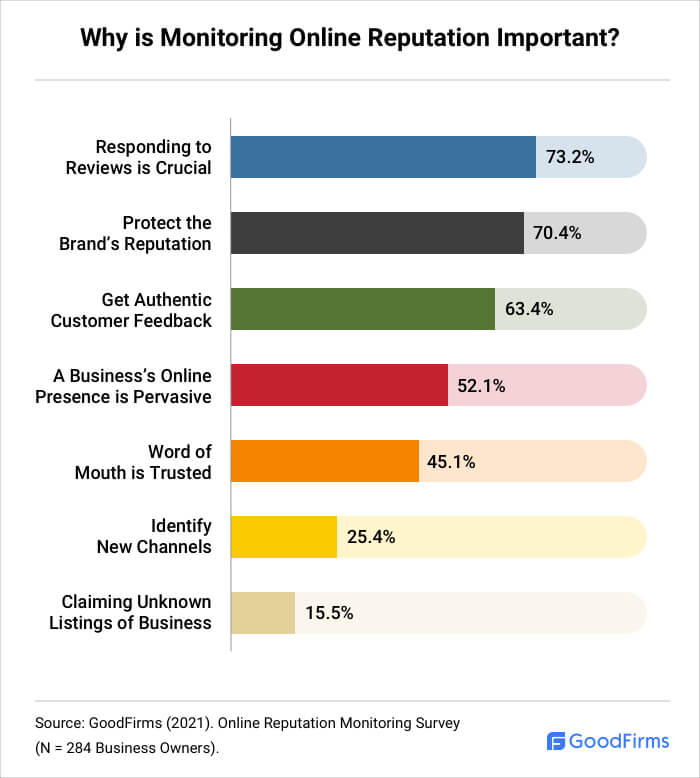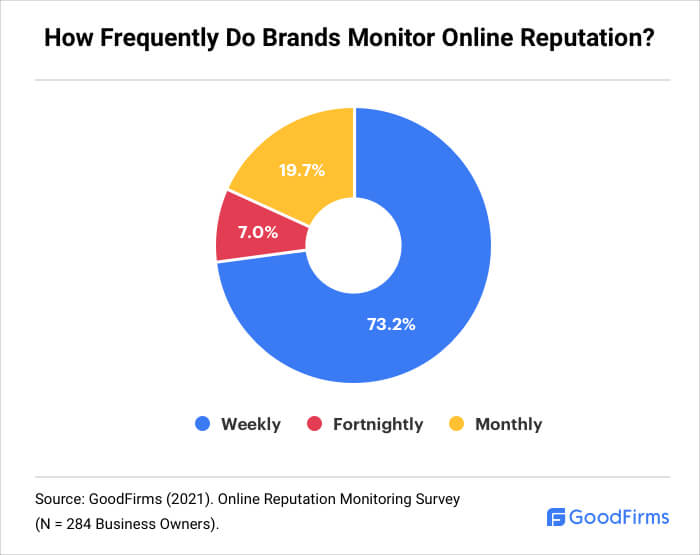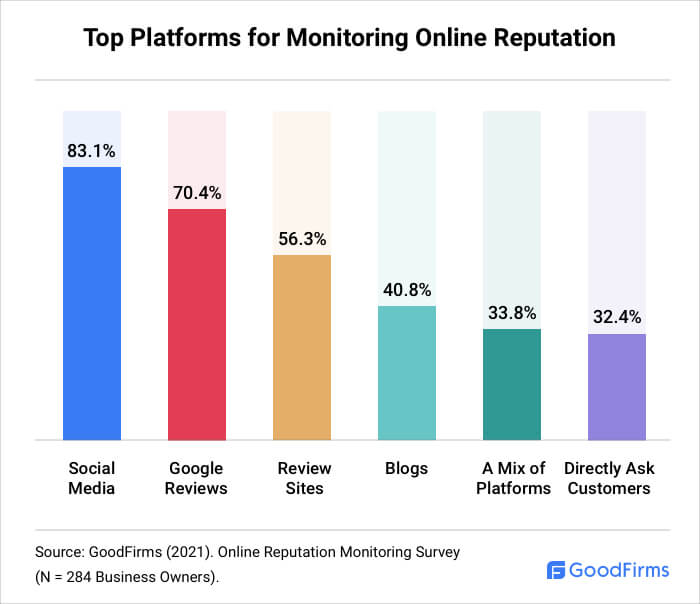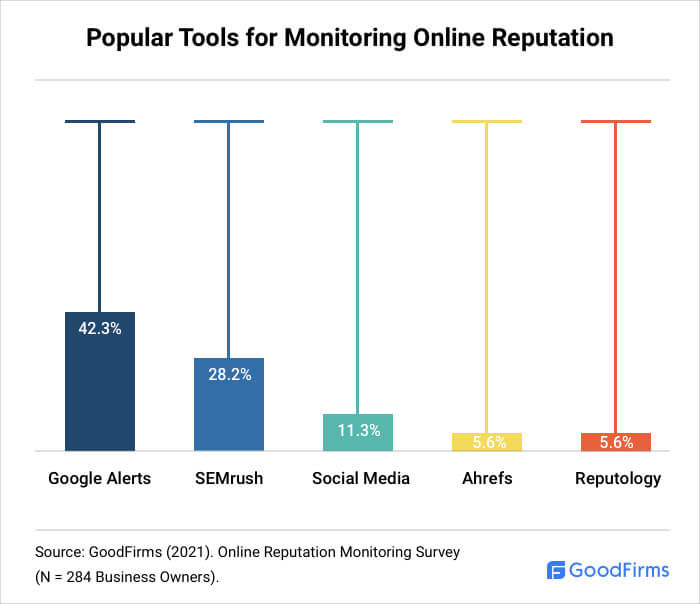Ever since the world went online, everyone chooses to post their opinions or experience on different platforms. While this may not be a big deal for individuals, it is certainly a crucial shift for businesses and their interaction with customers.
Keeping a track of what people are saying online about the business is beneficial. More so for small businesses as they usually thrive on word-of-mouth publicity and referrals. In such a situation, what happens when an unhappy customer chooses to broadcast their experience online? The business will suffer in more than one way.
This is where online reputation monitoring comes into the picture. It will help a business keep track of whatever is being said about it online irrespective of the platform. Online reputation is not only the result of what a business does but also the influence of what people say about it. So, it is important for SMBs to identify the potential pitfalls and keep tabs on the issues that can impact a business.
As the importance of online reputation is ever increasing, it is necessary to know the frequency, online platforms, reasons, and tools for monitoring it. GoodFirms surveyed 284 small business owners for the best tips on online reputation monitoring.
Why is it Important to Monitor a Brand’s Online Reputation?
In today’s world, businesses need to be aware of everything that is being said about them online. It will not be an exaggeration to say that taking customer feedback for granted can have disastrous effects on the brand’s reputation in both - short and long term. As responding to reviews is crucial, it is voted the most important reason for monitoring online reputation by 73.2% of the survey respondents.

Some business owners may be of the opinion that responding to reviews is a waste of time and effort, but it is far from the truth. As per a study, 96% of people read a business’s response to the customer review. This data establishes that it is absolutely essential to respond to customer reviews.
Another reason to monitor online reputation is to protect the brand’s reputation. 70.4% of SMB owners agree with it. Not all online reviews are trustworthy and can be accepted as social proof. Sometimes, a business can become a victim of fake reviews.
Fake reviews can bring down the overall ratings which will ultimately affect sales and customer’s trust. Such reviews have certain identifiable characteristics and can be easily detected using an online review monitoring tool. So, online reputation monitoring is important as such reviews can be detected in a timely manner and relevant action can be taken to save the brand reputation.
Online reputation monitoring will also help a business to get authentic customer reviews. So, it is again an important reason according to 63.4% of businesses to constantly monitor online reputation. Authentic customer reviews are an opportunity to get an in-depth understanding of the brand’s quality and what can be improved in their opinion. For instance, if there is a common complaint in multiple reviews then it is something that needs to be fixed immediately.
How Frequently Should a Brand Monitor its Online Reputation?
People’s online reviews about a business have long-term implications for a brand. It will also determine whether more customers are attracted and retained or end up leaving the brand for good. As per our survey, 97.2% of businesses invest time and resources in monitoring their online reputation.
This makes online reputation monitoring mandatory for businesses to succeed. Keeping this in mind, a significant number (73.2%) of small businesses monitor their brand’s online reputation weekly.

There is no denying the fact that online content circulates at a lightning speed and it can change the perception of a brand within seconds. While it can be a little easier for large businesses to manage their online reputation by investing more resources, it is a little more challenging for small businesses. It can be said that online reputation monitoring will give SMBs a chance to reclaim their brand’s narrative.
Small businesses that are still not proactively monitoring their online reputation regularly are giving third-party sources the opportunity to define their brand to potential customers. If those sources have good things to say about the brand then it will definitely do good for the business. But if it is negative media or even false negative claims then it can dissuade customers from purchasing a product or service.
Therefore, to avoid giving anyone else control over a brand’s reputation, it is always better to proactively monitor online reputation at whatever frequency feasible for the business.
What Platforms Do Brands Monitor?
Starting from social media and blogs to review and news websites there are a lot of platforms that brands need to monitor for their online reputation. A majority of businesses (83.1%) consider social media as the most important platform for online reputation monitoring.

Social media has given people the freedom to post their experiences and opinions. This freedom has limited the control that companies have over their online reputation. A business can control the Google search engine rankings but not the comments that people post on their social media pages. Due to this, social media has become an essential part of the online reputation monitoring landscape.
As per the GoodFirms survey, the next platform in line is Google Reviews. Google rules the world. If a customer finds a business, it is most likely through the world’s most popular search engine. Google reviews act as social proof and help customers shortcut their research and make quick decisions.
Moreover, not everyone is going to check the social media pages of every brand they are considering for their purchase. In the case of quick searches, it is always the Google reviews that come in handy. Therefore, Google reviews are the second most important platform to monitor the online reputation of a business.
How to Monitor Online Reputation?
The benefits of online reputation monitoring are innumerable but there are still some businesses that are starting out. The process may seem confusing and overwhelming initially. But following the best tips from experts will make it easier to monitor the online reputation of a business.
1. Automate the Process Using Software or Tools
The online reputation of a business is one of the strongest measures of its success in the digital world. It means monitoring a brand’s reputation online should be a part of the digital marketing strategy. While online reputation monitoring is absolutely essential, it is a tough task too because of a growing number of platforms to monitor.
In such a case, the best way out is to automate the process a little using software or tools. 42.3% of business owners consider Google Alerts as the top online reputation monitoring software.

SEMrush is voted among the top tools for online reputation monitoring with 28.2% of survey participants rooting for it. Ben Wallington, the CEO of Designerwear explains, in brief, the benefits of using SEMrush. He said, “SEMrush also measures our online reach but looks into aspects of SEO as well. We can track down pages that mention us, and request backlinks if there aren't any. This feature is really useful in my eyes, as it helps us improve our visibility and the number of people who visit our website. It also does a ton of other stuff, like measuring increases in traffic as a direct result of referral mentions. This tells us if what we're doing is working and what we need to improve.”
There are a number of tools available in the market to monitor online reputation. However, tools that offer information on the basis of relevant factors give a clear picture. The Co-founder of Click Intelligence, Simon Brisk, discusses one such tool, Social Mention.
In Simon’s words, “Social Mention is also a great tool as it allows us to not only monitor but also improve our brand’s online reputation. It gives results on the basis of four factors; Strength, Passion, Sentiment, and Reach. Strength is the probability that our brand is discussed on social media, sentiment is the ratio of positive and negative comments, Reach is the number of people who write about our brand, and passion is the probability that people talking about our brand will be doing so repeatedly.”
For businesses who have accounts on all sorts of platforms, an online reputation monitoring tool that not only monitors various platforms but also enables to get valuable information on other important aspects will be a perfect choice.
2. Keep an Eye on Social Media Platforms Regularly
Checking social media is a must for online reputation monitoring even if a brand doesn’t post daily on the platforms. SMBs should check the notifications and alerts for any new comments that need addressing on the respective platforms. If a single person is handling all of the digital marketing activities, it is recommended to set reminders for checking the profiles daily.
A Copywriting Assistant at Giraffe Social Media, Amber Reed Johnson, states why it is vital to keep a tab on the social media platforms and suggests software for the same.
In her opinion, “One of the most underrated ways to monitor the online reputation of your small business is through social media. Consumers tend to head to social media to air their honest thoughts and opinions of a brand, whether they’re negative, positive, or neutral. Using social monitoring, you can discover who’s discussing your brand and where even if they haven’t tagged your business directly. Much third-party social media management software, such as Sprout Social, can help you with this and combine all ‘messaging’ into one easy-to-digest feed.”
Social media platforms are where people of all ages, races, castes, creeds, etc. are present and freely post their opinion on things. This makes social media platforms a great source of gaining insights into the mindset of people and understanding do’s for positive feedback and don’ts to avoid any negative reaction.
Satya Parija, Head of Marketing at Doctor Spring, suggests regular monitoring of social media platforms as it is the best way to remain updated on the opinion of a variety of people about the business.
He said, “Always “stalk” social media. It would be best if you watched your social media channels daily. Social media is the easiest way to stay updated on what is being discussed, even when it comes to a business. We use social media to listen to what people have to say about our company. The great thing about using social media is that there are many platforms with different people and behavior. You can get almost any type of review or reaction from these channels.”
Just like the reviews, it is necessary to respond to both - positive and negative comments about the business. It is easy to respond to the positive comments but it is the negative comments that need to be handled gracefully. In most cases, it is better to respond to the negative comments but it is also appropriate to delete or hide comments sometimes. When a person writes something vulgar or makes threatening remarks, remove the comments immediately.
3. Monitor Business Review Websites
Business review websites have become an essential part of a customer journey in the online world. Customers can make snap decisions on the basis of these reviews without ever contacting the business or visiting the store. So, checking business review websites is one of the obvious ways to monitor the online reputation of a business. It is also essential to check the review websites regularly as many online directories allow anyone to add a listing, even if it is not the business owner who listed his/her business. The listing would still be there collecting reviews for the business.
If that happens, a business owner should immediately claim the listing whenever possible and then continue to monitor such websites frequently.
Also, business review websites usually send alerts when a business receives a new comment. However, with so many notifications popping up on screens each day, it is quite a possibility that one such notification is missed. So, it is always worth checking business review websites at least once a week to ensure that nothing important goes unnoticed. Apart from the major websites such as Google Reviews and Yelp, a business should not forget to monitor the niche review sites specific to the industry.
The top business review websites are:
- Google My Business
- Amazon
- Yelp
- Trip Advisor
- BBB (Better Business Bureau)
- Yellowpages
- Foursquare
4. Set Up Google Alerts
Other tools come and go but Google Alerts is one of the most effective tools of the trade and also the most popular one to monitor online reputation with 42.3% of businesses voting for it. Setting up Google Alerts may be time-consuming but it is a tailorable tool that can be adopted for a range of online reputation data gathering endeavors.
Viva Flavor's Founder, John Bedford gives a brief idea about Google Alerts. He says, “The easiest way to track the web presence of your brand is to set up Google Alerts for your company name. It's entirely free as long as you have a Google account, and you should enter all possible spelling deviations. If your brand name is mentioned online you'll receive an automatic email. At that point, you have the opportunity to join the conversation and either respond to a negative discussion or reinforce the positives. Either way, it's an easy win for the business.”
A good thing about Google Alerts is that it helps not only in monitoring the business mentions but also assists in getting updates on competitors’ mentions and activities. In short, it gives an overall idea of what is happening in the industry.
James Jennings, a Creative Manager, discusses in detail how Google Alerts can be more useful in online reputation monitoring.
In James’s opinion, “In my small business, I’m not only using Google alerts to keep track of what people are saying about my business but of my competitors as well. With it, I’m keeping myself informed about what they’re doing, especially where they went wrong. This way I can easily avoid those mistakes and prepare countermeasures in advance in case I make the same error. Google alerts come in very handy every time your business receives a bad review or if someone says something bad about your business. The moment your business is mentioned, you're alerted and can mitigate any issues before it gets worse.” James is from Home Garden HQ.
In Google Alerts, it is possible to create as many alerts as possible. But it is suggested to control the temptation to set up too many alerts as a business may end up being bombarded with alerts that have nothing to do with the business.
5. Assign Dedicated Personnel And Time
Monitoring on a regular basis can be an overwhelming task. It may not be possible for a single person to manage other tasks and monitor the online presence too. In that case, it is better to assign dedicated personnel for the same. This will ensure that online reputation monitoring is done efficiently and effectively.
The Web Operations Executive at InfoTracer, Ben Hartwig says something on similar lines.
Ben said, “For a small business to monitor its online reputation effectively, I believe the best method would be to designate a community manager. This is highly effective since the community manager is the person who would follow the position of the business online by monitoring review websites, social media presence, and should be the one that answers questions and reviews by both happy and disgruntled clients.”
On the other hand, not every SMB can afford to hire dedicated personnel for monitoring online reputation, and neither can they allow employees to do it every day as other tasks will be affected. In such a situation, the advice of Total Shape's Founder, Isaac Robertson can come in handy.
“The best recommendation I can give for keeping track of your internet business is to designate a specific day of the week as a "check-up day." It's exactly what we do at work. Throughout the day, we check everything, including our social media accounts, blogs, and, of course, our Google search results for reviews. When we receive bad feedback, we call out to the person who left it, apologies, assure them that their concerns have been heard, and inform them that we are working to improve our service,” said Isaac.
Lastly, there is always an option to outsource the work to online reputation management services. Although a business may need to spend some time researching possible service providers, it can be a profitable partnership in the long run. That’s because the business can utilize its resources on other tasks that need to be done in-house and at the same time online reputation will not suffer.
Conclusion
As more and more people are sharing their experiences online, monitoring brand reputation online has become essential for the success of business. If a business chooses to not monitor its reputation online, then it risks losing control over the brand’s narrative. Moreover, as times are changing and the number of platforms increasing, online reputation monitoring needs to be automated a little with the help of software/tools instead of manually doing it.
Apart from the five tips mentioned above for monitoring online reputation, the other ways to do that are to check the website’s blog pages, identify and follow the industry hashtags, monitor the ad campaigns that are run on social media platforms like Facebook and Instagram, and lastly reach out to the customers and get their feedback.
About the Online Reputation Monitoring Survey
GoodFirms surveyed 284 businesses to gather insights into the best tips to monitor a brand’s online reputation in 2021.
We sincerely thank our Research Partners for helping us garner participants and their valuable contributions to the survey.
The survey participants include Founders (31%), CEOs (28.2%), Marketing Professionals (23.9%), Business Owners (7%), and Others (9.9%).
The type of businesses to participate in the survey were B2B (52.1%), and B2C (47.9%). Lastly, the survey participants belonged to a variety of business sizes: 4.2% of freelancers, 91.5% of small businesses, and 4.2% of medium businesses.
* For any queries, drop an email to [email protected]
- Aimvein
- Ask April
- Best Price Nutrition
- Better Proposals
- BidFortune
- Black Storm Design
- Brandinc PR
- Brenton Way
- Cameron Miller Real Estate
- Classy Inbound
- Click Intelligence
- CocoDoc
- CocoFinder
- ConvertBinary
- Designerwear
- Diggity Marketing
- Disco
- Doctor Spring
- Eduard Klein
- Flooring Masters
- ForexToStocks
- Founder Jar
- Giraffe Social Media
- Global Green Family
- Gravy Solutions
- Hire Ukrainian Developers
- Hive19
- Home Garden HQ
- Hurryworld
- Incorporation Insight
- InVideo
- Jon Torres
- Lawrina
- Liquid Web NZ
- Live Lingua
- Logit
- Mavens & Moguls
- Millionaires’ Mentalist
- Ministry of Hemp
- Mold Busters
- Moriarty's Gem Art
- My Supplement Store
- NH Strategic Marketing, LLC
- Numlooker
- Parenting Questions
- People Finder Free
- Pixoul
- Repair Sprout
- Return GO
- Rover Pass
- RRP Jewellers
- Sapochnick Lawfrim
- School Authority
- ServerGuy
- Simplyee Cleaning Solutions LLC
- Spyic
- Stevens Performance Group
- Testimonial Hero
- The Blueprints
- Titoma
- Total Shape
- Transitional Web Design LLC
- Twibi
- VinPit
- Viva Flavor
- Webris
- WellPCB Technology Co. Ltd
- Xwerks




